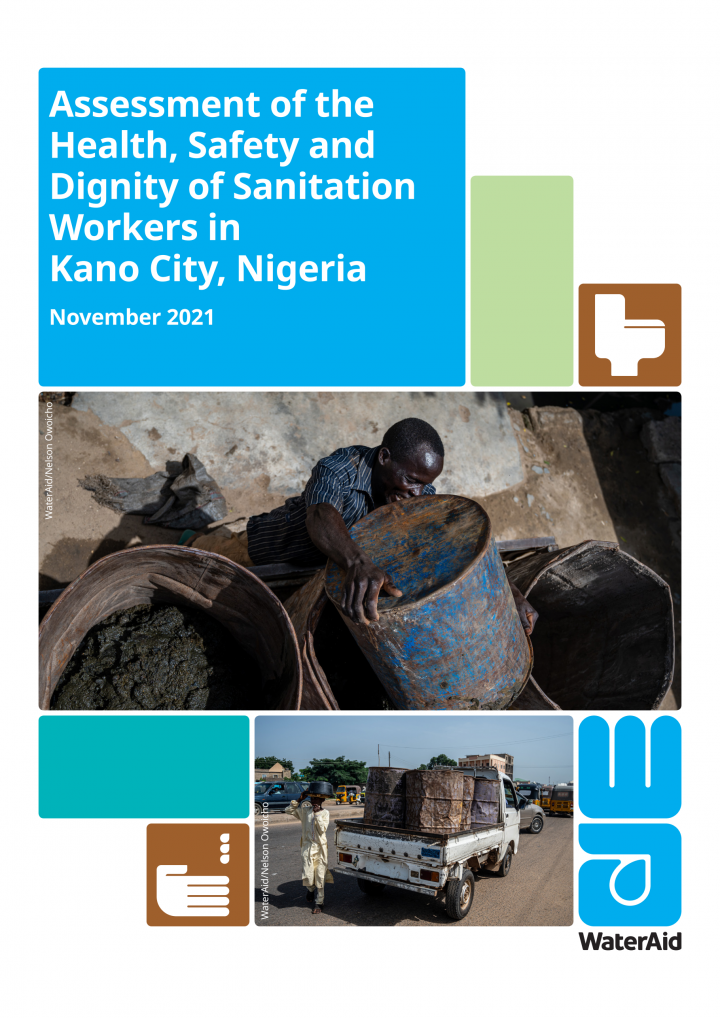Assessment of the Health, Safety and Dignity of Sanitation Workers in Kano City, Nigeria WaterAid (2021)
Sanitation workers provide an essential public service to reach Sustainable Development Goal 6.2, but often at the cost of their dignity, safety, health, and living conditions. A key barrier to providing support for this profession is the insufficient data on sanitation workers and their work environment. As such, the aim of this assessment was to explore opportunities to support sanitation workers in Nigeria, including strengthening the enabling environment.
The assessment focused on Kano City and the methodology included a literature eview, Focus Group Discussions (FGDs), Key Informant Interviews (KIIs), and In-Depth Interviews (IDIs). The majority of the 45 participants were sanitation workers and officials from the Manual Pit Emptiers Association and the Vacuum Trucks Owners Association. Other participants included relevant government officials, traditional and religious leaders, and academics.
The assessment identified two major types of sanitation workers in Kano City: Manual emptiers (50 groups) and mechanical/gully emptiers (12 private companies). 94% of sanitation workers were forced into this profession due to economic hardship. Sanitation workers are aware of the risk attached to their profession, yet only 25% reported to have used Personal Protective Equipment (PPE), while 75% don’t use any.
Sanitation workers in Kano City face various challenges, including access to office and parking space, the use of old tools and vehicles, and occupational hazards that can lead to illnesses, injuries, or even death. In addition, the current enabling environment does not support sanitation workers, with a weak institutional arrangement and legal framework and access to only three designated faecal sludge disposal sites.
The assessment confirmed that faecal sludge in Kano City is extensively disposed of untreated into the environment. Disposal practices vary depending on the season but include sanitation workers dumping faecal sludge into drains on the city’s outskirts. As such, the assessment identified the following recommendations to support sanitation workers and strengthen the enabling environment:
• Reform policies, regulations, guidelines, and institutional arrangement.
• Construct, operate and maintain faecal sludge treatment plants (FSTPs).
• Provide support to sanitation workers (e.g., financial tools, equipment).
• Improve health and safety for sanitation workers.
• Revisit the health and safety guidelines for sanitation workers.
• Register and license the sanitation workers’ organisations.
• Develop and implement a behaviour change campaign on the rights
• and dignity of sanitation workers.
• Establish partnerships with various stakeholders.
Bibliographic information
WaterAid (2021). Assessment of the Health, Safety and Dignity of Sanitation Workers in Kano City, Nigeria WaterAid
Filter / Tags
Urban (entire city)Research publicationsEnglishImport to Sanitation Workers PlatformHealth & SafetyDignityHealth & SafetyDignity
Downloads
Assessment of the Health, Safety and Dignity of Sanitation Workers in Kano City, Nigeria
Type: application/pdf
Size: 3.13 MB

